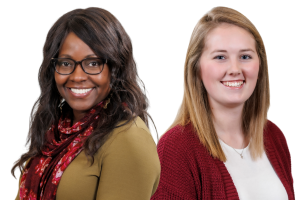Strength in Challenges: Building Stronger Communities Through Philanthropy

This blog was co-written by Dora Anim, president & CEO of the Bethany Legacy Foundation, and Clarice Patterson, executive director of Genesis: Pathways to Success (Ripley County Community Foundation), to provide an inside look into their first Mutz Philanthropic Leadership Institute class.
Philanthropy at the Intersection of Equity, Culture, & Policy
We work in very complex industries—trying to solve problems people don’t always understand. This is the case, especially in philanthropy, which means ‘love of humanity’ and represents generosity in all forms with the goal of benefiting people in society. Yet, the societies we seek to impact are also complex and are composed of institutions, policies, cultures, networks, and various structures.
Our morning speaker, Molly Martin from New America, proposes a great framework to consider as we seek to deepen our impact, i.e., the intersection of equity, culture, and policy.
From an equity standpoint, the makeup of our country is changing and moving toward a white minority. Census figures are projecting that the country will be less than 50% non-Hispanic white around 2043. Yet, with this fast-approaching reality, disparities remain wide across racial and ethnic groups nationally, including in Indiana. Examples include wage gaps, access to healthcare and technology, education, and systemic barriers such as racism and sexism. Unfortunately, there are policy decisions that have created big gaps for various groups, not just federally but at the local level, too.
We also live in a constant state of change. Our communities have continued to evolve since COVID-19, which accelerated big shifts—more dependency on technology, shifts in middle income, and the economy.
The time has never been more critical for philanthropy to build trust with and in communities as we sit at the intersection of equity, culture, and policy. This will take intentional work as we might come across as ‘untrustworthy’ for a number of reasons ranging from historical factors to lack of lived experience and lack of true community engagement. This year will also be a big year of potential political distrust.
There are ways to build trust with communities authentically, which will be important. Opportunities include trust-based philanthropy, cultural competence, and community engagement that includes appreciative inquiry. Building trust enables us to create space for emerging communities to talk about the opportunities for transformation and systemic changes, promotes high civic engagement, and promotes collaboration and interest in participatory design/co-creation of solutions.
Philanthropy can play a powerful role as ‘society’s risk capital.’ Sitting in the intersection of equity, culture, and policy is challenging, but there is strength in facing these challenges to forge a better future.
Inflicting Inspiration Among Philanthropic Leaders
In the words of Ricken Warren, a renowned author and pastor, “While it is wise to learn from experience, it is wiser to learn from the experiences of others.”
The Mutz Cohort had the distinct honor to hear from alumni of the Mutz Philanthropy Leadership Institute: Juan Galeano of The Clowes Fund (Class of ‘22), Travis Tester of Foster Success (Class of ‘23), and Allen McClendon of OneAmerica (Class of ‘23). These gentlemen gave tips and words of wisdom to this year’s cohort to ensure each participant can make the most of their experience.
